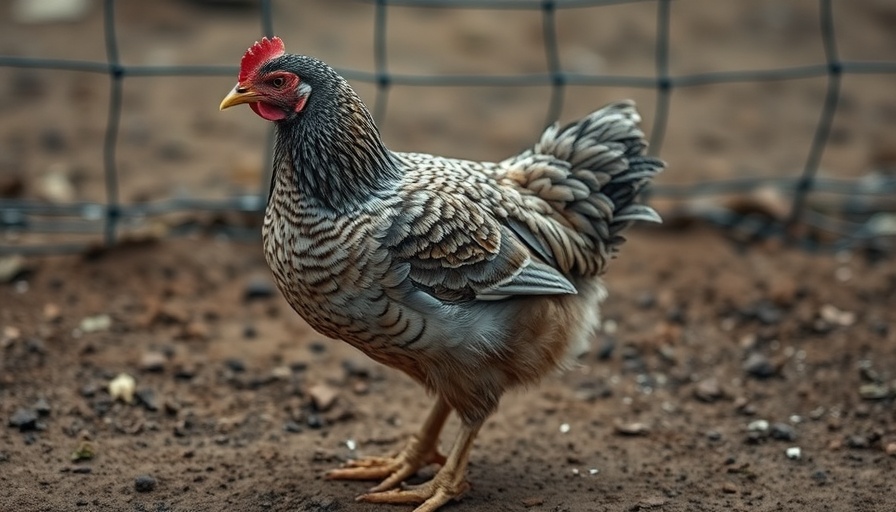
How to Support Molting Hens with Protein: Essential Tips for Chicken Keepers
As a chicken keeper, discovering that your hens are in the midst of a molting period can initially spark panic. The sight of feathers lining the coop may make you worry about their health. However, it's essential to remember that molting is a natural process, typically occurring from mid-summer to November. Different chicken breeds have their unique schedules, resulting in a colorful variety of feather loss throughout the season. For breeds that molt later in the year, such as the Silver-Laced Wyandotte, adequate care to ensure warmth is crucial to protecting them from harsh winter nights.
Understanding the Molting Process
Molting is an annual shedding and regrowth of feathers that allows hens to transition into a new feather cycle. This physiological process is a signal for your hens to redirect their energy from egg production to feather regeneration, which can result in a temporary halt in egg-laying. As a chicken owner, understanding this cycle can help you make better choices to support your flock's health during these months.
Protein-Rich Boosts for Your Hens
To aid your hens in enduring the molting process, increasing their protein intake becomes essential. Here, we've compiled some effective sources of protein that can help support your molting hens:
1. Digging the Garden
Let your hens forage in the garden as you dig. They will eagerly gobble up bugs, worms, and even leftover plant matter, giving them a natural protein boost. This method promotes an active, healthy lifestyle for your hens and allows them to pursue their foraging instincts.
2. Mealworms: A Favorite Treat
If free-ranging isn’t an option, consider bulk-ordering dried mealworms. These protein-packed treats are highly appealing to chickens and can be a great addition to their diet, especially during molting. Mealworms are calorie-dense and full of the essential nutrients they need to support feather growth.
3. Encourage Free Ranging
When possible, allow your chickens to roam your yard. This practice not only increases their protein intake through natural foraging but also gives them a chance to engage in social behaviors. Keeping your hens active while they grow new feathers can promote their overall well-being.
4. Scrambled Eggs as a Protein Source
While it may seem unusual, serving your hens scrambled eggs is an excellent way to boost their protein intake. Providing them with this cooked delicacy, particularly on chilly mornings, can be both enjoyable and beneficial. Just remember to do this sparingly to prevent them from forming egg-eating habits.
5. Commercial Chicken Feed
Many commercial feeds are formulated specifically for molting chickens, containing higher protein levels than regular feed. Consider transitioning to a quality feed designed for this phase of their lifecycle to ensure they're getting the optimal nutrition.
6. Reduce Carbohydrates
Offering your hens a diet low in carbohydrates during their molting phase can also be beneficial. Reducing access to grains and bread encourages them to consume more protein-rich foods, facilitating a more focused energy output on feather regrowth rather than excess weight gain.
The Larger Picture of Sustainable Urban Farming
As a chicken keeper within the urban farming community, the practices you employ can significantly impact not just your hens but also the environment and the local ecosystem. By integrating sustainable agricultural practices, you contribute to a movement that promotes self-sufficiency and healthful living.
Building a Sustainable Backyard
Incorporating chickens into your urban garden is not just about egg production; it's also about creating a sustainable system that enhances your gardening practices. Chickens can aid in pest control, contribute to fertilization through their droppings, and produce valuable protein through foraging, all while providing companionship.
Exploring Community and Global Perspectives
As the urban farming movement grows, communities are discovering the importance of local food systems. By raising chickens and growing your own vegetables, you're not just nurturing your immediate needs but also joining a larger network advocating for food sovereignty and environmental health.
As you navigate the ups and downs of chicken keeping, especially during molting seasons, remember that support and knowledge are essential. Embracing these methods will not only help your hens thrive but also deepen your connection with urban agriculture. So, continue to explore, learn, and cultivate not just your land but a more sustainable food future.
 Add Row
Add Row  Add
Add 




 Add Row
Add Row  Add
Add 

Write A Comment